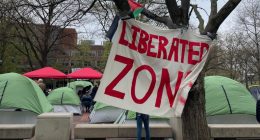
Iran continues to be gripped by nationwide protests against the Islamic regime, demonstrations sparked by the death, on Sept. 13, of 22-year-old Mahsa Amini who died while in police custody after having been arrested by Iran’s morality police for allegedly violating Iran’s strict rules requiring women to cover their hair with a hijab.
The protests are the largest and most sustained bout of civil unrest to grip Iran since 2009 and are seen by many as a true threat to the future of Iran’s Islamic rulers.
While Amini’s death was the spark that ignited this current wave of demonstrations, unrest had been simmering all summer in Iran, and the response by the police has been brutal. In July, authorities imprisoned two Iranian directors, Mohamad Rasoulof and Mostafa al-Ahmad, for voicing opposition on social media to the government’s violent crackdown. In response, Jafar Panahi, the award-winning director of Taxi, 3 Faces and The Circle, and arguably the most prominent dissident artist in the country, was detained when he visited the Tehran prosecutor’s office to inquire about Rasoulof and Al-Ahmad. He was then thrown in jail, with authorities claiming he had to serve out a six-year prison term connected to a sentence handed down a decade ago that had never been enforced.
Since Panahi’s arrest, Iranian dissidents have tried to mobile the international entertainment community to back the protestors and pressure the regime to free Panahi and others. At this year’s Venice Film Festival, organizers and filmmakers staged a protest on the red carpet ahead of the world premiere of Panahi’s new film No Bears, calling for his release. Panahi, from his cell, also sent a letter to the festival, thanking the international community for “making noise” in support of Iranian filmmakers but warning the government crackdown “isn’t finished yet.”
Earlier this month, more than 1,000 working professionals from the world of French cinema, signed an open letter to “support the protesters loud and clear.” In a public demonstration, some 50 actresses, including stars Juliette Binoche, Marion Cotillard and Isabelle Huppert, posted videos of them cutting their hair as part of #HairForFreedom, a widely viewed Instagram video campaign in support of the protestors.
As demonstrations, and the government’s response to them, have grown in intensity and violence, the fate of Panahi and others arrested by the Iranian regime remains uncertain.
In an exclusive interview, carried out via email, The Hollywood Reporter spoke to Jafar Panahi’s son Panah Panahi and asked him about his father’s condition, the state of the protests and what support from the international film community means for those fighting the regime.
Do you have contact with your father? How is he doing in prison?
Yes, we are in contact with him. Jafar is in the public unit and calls every day, and we meet him in person once a week. … He has made a lot of friends in prison; all of whom are honest and straightforward fellow Iranians, including doctors, engineers, writers, directors and poets, as well as top-rank university admittees and environmental activists. Overall, whoever is concerned about Iran is in prison. … The nice thing about prison for Jafar is that now he has been forced to exercise and read more to pass the time.
What have the authorities said about why they imprisoned him?
It may seem weird to you, but we ourselves don’t know why Jafar is in prison. His judgment says “collusion against the regime”. It means activity against the regime. It is a general conviction used for all political, environmental, and other prisoners.
What does the government hope to gain from his imprisonment?
You say the government, but we say the regime of the Islamic Republic. It is because no matter which government takes over, in the end, the policies of [supreme religious leader] Sayyid Ali Hosseini Khamenei and his regime are the ones that matter. I don’t see the problem with the government, although the government of Ebrahim Raeisi is one of the most retarded and corrupt governments we have ever seen. Just think about the fact that our president has only a sixth-grade education. What can you expect from him?
They want to keep the other artists silent by imprisoning Jafar. In general, this regime tries to imprison, from every field, a thought leader who is concerned about Iran and protests to serve as an example to others to keep their mouths shut. It’s that simple, just like all other totalitarian governments. They are totally unresponsive. Because responsiveness is not part of this regime’s makeup. They just refer to the judge’s statement and say this is the judgment and we must respect it. They are undereducated people who have risen to power and have stuck to their positions and won’t let go. It is in their nature to be evasive.
What is his response to being imprisoned —has it changed/strengthened his position regarding the Iranian regime?
The position of Jafar was not a personal one to change. Jafar is like a sociologist who knows his people and their pains and sees the injustice that they experience and he’s turned those into his concerns, concerns he reflects in his works. What Jafar says is nothing more than a call for basic human rights and a rejection of the tyranny imposed on the society due to ignorance.
His position has not only not changed, he has gotten stronger and more determined, and his voice has spread more widely. With the exception of those inside the [Iranian] entertainment industry, who have not supported him out of fears of reprisals from the regime.
What are you doing to secure his release?
We have been able to retain a lawyer, and we have filed two appeals so far. But the judgment has not changed; there are no other legal avenues available to us.
How do you assess your chances of securing his release?
It cannot be predicted at all; it is inconclusive to evaluate such a thing in a government in which logic plays no role.
What role are Iranian filmmakers playing in the current anti-government protests? Is the response different this time — it seems even officially approved directors like Asghar Faradi are speaking out.
This time is definitely much different, and there are more artists supporting the people. The restrictive policies of the government put artists in a tight spot. There is no hope for reform, and the only thing that the government does is exert pressure on the people. But if these demonstrations are also suppressed, the opposition will come back stronger next time. Because the more people are put under pressure, the angrier they become, until they have nothing to lose.
A few days ago Khamenei said the protests of the artists and athletes had no value. He just said this one sentence and moved on. The fact that Khamenei has heard the voice of the protesters and was forced to talk about it means that the protests of the filmmakers and athletes have been much more effective than in the past.
We have seen the film industry in other countries, including France and the U.S., support the Iranian protests. What impact, if any, has this had?
It is too early to discuss and analyze the recent protests. But the most beautiful thing that has come out of it is that a collective intelligence has been created, and the people are not looking for a leader and it is the collective intelligence that is leading the protests. The government always blames the USA and Israel and their supposed agents in Iran for the protests. It cannot do that anymore because even its few supporters no longer accept it. Everybody can see this collective intelligence that is not following a particular person or persons. The motto the people of Iran are chanting is: “Woman, Life, Freedom.” This has nothing to do with any political or partisan line. It is a request for basic human rights.
The support of world-famous celebrities and artists has definitely had a significant impact in raising awareness, and the more awareness is raised the louder the voices get and the greater the unity of the people. That is something that scares a totalitarian government.
We have seen anti-government protests in Iran before. How optimistic are you that the protests this time will have a lasting effect to change things in Iran?
These protests have not emerged overnight. I look at protests in 1999, 2009, 2017 and 2019, and I can see the evolutionary path of the protests; each time people are less afraid and the mottos and slogans get more forceful. Not the slogans are targeting the regime itself. We can clearly see this evolution.
Interview translated from Farsi and edited for length and comprehension.
Read More: World News | Entertainment News | Celeb News
Hollywood





